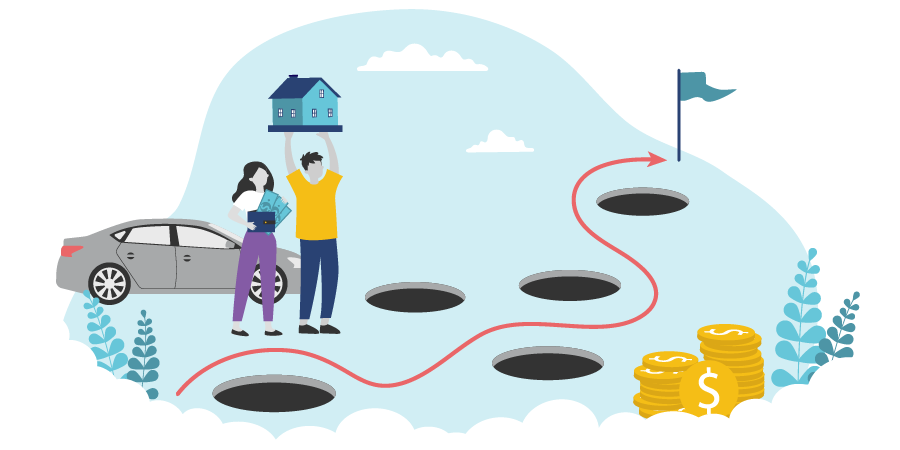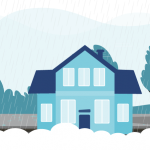7 Costly Home & Auto Insurance Mistakes—and How to Avoid Them
January 3, 2025

When it comes to your Home or Auto Insurance policy, it’s easy to assume that you’re already getting a good deal from your current provider. But a simple oversight could leave you underinsured, overpaying—or both—without you even realizing it!
As we step into the new year, it’s the perfect time to embrace a New Year’s resolution that’ll help you achieve smarter savings and better protection: taking the time to understand and optimize your insurance policy.

It’s not just about cutting costs (although saving money is always a bonus!); it’s about ensuring you have the proper coverage in place when it matters most. In times of crisis, having the right protection in your back pocket can make all the difference—and we’re here to guide you there.
To help you start the New Year on the right foot, here are the most common Home & Auto Insurance mistakes to avoid:
1. Assuming insurance rates are the same across different companies.
One of the most common misconceptions about Home & Auto Insurance is that all providers offer similar rates for the same coverage. In reality, insurance premiums—and coverage options—can vary significantly between providers based on factors like your claims history, location, the make/model of your car, and even the way each insurer calculates risk.
The last thing you want is to be stuck overpaying for your policy, or missing out on better coverage for less—that’s why it’s crucial to shop around and compare options! Don’t know where to start, or simply don’t have the time? Working with an insurance broker like PROLINK can streamline this process. We won’t just provide you with a quick quote—we’ll take the time to understand what’s important to you, ensuring that you get a tailored solution that best fits your lifestyle and budget. With our strong relationships with leading insurance providers, you can trust that we’ll shop the market on your behalf—without you needing to lift a finger.
2. Not asking about discounts.
One of the easiest ways to save on Home & Auto insurance is by taking advantage of hidden discounts. Many people miss out on significant savings—simply because they don’t ask! Insurance companies don’t always advertise them, but you could get a discount for something as simple as having winter tires, bundling your Home & Auto policies, paying off your mortgage, or being a long-term customer!
Directly asking your insurer or broker about available discounts can uncover savings you didn’t know existed, reducing your costs without compromising on coverage. Don’t leave money on the table—start the conversation and ensure you’re getting every discount you deserve.
RELATED: The Top 17 Auto Insurance Discounts Revealed
3. Opting for a larger percentage discount instead of looking at what’s actually saved.
Keep in mind that a larger discount on your insurance policy doesn’t always translate to the lowest price—a seemingly smaller discount on an already affordable policy could save you more overall. For example, a 25% discount on a $2,000 policy may sound appealing, but it still leaves you paying $1,500, while a 10% discount on a $1,500 policy brings your final cost down to $1,350.
Be sure to look beyond flashy promises and large percentages; compare the total cost and coverage value to find a policy that offers true long-term savings and peace of mind.
RELATED: Usage-Based Insurance: Drive Smart, Pay Less
4. Choosing the cheapest price instead of the greatest value.
The cheapest price isn’t really the best deal if it doesn’t provide the right coverage for your needs. Low-cost options typically only include the bare minimum, lacking essential coverage and valuable add-ons that will save you money and stress in the long run!
For instance, opting out of Direct Compensation Property Damage (DCPD) coverage might seem like a quick way to save 5-10% on your Auto Insurance—but the consequences could far outweigh the savings. DCPD coverage is optional in Ontario, and ensures that policyholders are protected if another driver is at fault in a collision. Drivers who opt out would be left with substantial out-of-pocket repair expenses in the case of an incident, even if they were not at fault.
Some insurance companies also provide value-added services, like access to discounts on home security systems, water-leak detectors, winter tires, and anti-theft devices for vehicles—all to help you lower your risk of loss or damage.
RELATED: Filing a Home or Auto Insurance Claim? Here’s Why a Broker is Your Best Ally
5. Not informing your insurer of important changes.
Completing a home renovation, like finishing your basement, updating your kitchen, or adding a pool, can be an exciting endeavour—but don’t forget to keep your insurance provider in the loop! If you neglect to update your coverage, then your current policy might not account for the increased value of your home in the event of a claim, leaving you to cover the difference out of pocket.
If a secondary driver has started to drive your vehicle regularly (whether it’s a spouse, child, or roommate), not informing your insurer of this fact can create gaps in coverage and lead to denied claims. The same goes for car modifications, which could result in unintended insurance consequences.
To avoid the risk of being underinsured, it’s essential to notify your insurer of any relevant Home & Auto changes that could affect your coverage. Making these updates in a timely manner will ensure that your policy continues to provide the protection you truly need.
RELATED: 5 Things You Should Know Before Renovating Your Home
6. Filing frequent small claims instead of handling them yourself.
Making frequent insurance claims might seem like a smart way to make full use of your policy, but it can lead to significant premium hikes over time. Insurers often view a history of multiple claims (even if they’re all minor) as higher risk, which can result in higher rates or even policy non-renewals!
It might seem counterintuitive, but incidents like a small fender-bender or a broken window are often better handled out-of-pocket if the costs are manageable. Before you file a claim, consider the cost of the repair versus the potential long-term impact on your premiums.
Save your insurance claims for significant, unexpected costs that would be difficult to cover by yourself—this approach will help keep your premiums affordable and your coverage intact for when you need it most. And if you’re unsure about whether or not to make a claim, reach out to your broker for advice!
RELATED: Tips for a Stress-Free Home & Auto Claims Process
7. Not regularly reviewing your coverage.
Insurance shouldn’t be something you buy once and never revisit. Life moves fast, and changes like buying a new car, adding features to your home, or even shifts in your family dynamic can all affect your coverage needs. Treating your Home & Auto Insurance as a “set it and forget it” decision can leave you vulnerable to paying for unnecessary coverage—or worse, being underinsured when disaster strikes.
Reviewing your policy on an annual basis, and updating it as needed, will help ensure that your Home & Auto Insurance always stays aligned with your current situation.
Don’t wait until an unexpected event catches you off guard—take control of your personal insurance this year! Looking for an expert to guide you in the right direction? You can count on PROLINK.
With over 40 years of experience and access to a wide network of over 30 insurers, we’ve seen it all—and we know how to get you the right policy, from the right insurer, at the right price. We’ll be your dedicated advisor on all things insurance, helping you avoid costly mistakes and feel confident in your decision-making. And if you ever need to file a claim, we’ll be there to advocate for you every step of the way.
Make sure you’re covered for what’s to come—connect with PROLINK today and start the new year off strong!
PROLINK’s blog posts are general in nature. They do not take into account your personal objectives or financial situation and are not a substitute for professional advice. The specific terms of your policy will always apply. We bear no responsibility for the accuracy, legality, or timeliness of any external content.




